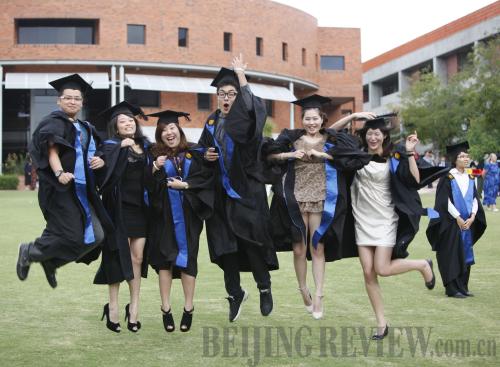|
 |
|
HAPPY GRADUATION: Chinese students celebrate before the commencement ceremony at Curtin University of Technology in Perth, Australia on February 11 (CFP) |
The problem-solving and communication skills he gained from his overseas experience laid a sound foundation for his later work at McKinsey, said Zhou, who successfully got a promotion as engagement manager after working in the highly competitive company for two years.
According to a survey conducted by Chinese media in 2010 among Chinese students who planned to study abroad, about 59.6 percent of the respondents said they decided to study abroad because of the better education quality in recent years.
The number of Chinese students who studied abroad surged in the past few decades.
According to the statistics of China's Ministry of Education, a total of 339,700 Chinese students went abroad for graduate and undergraduate studies in 2011, an increase of 19.32 percent over that of 2010.
When asked why he chose to return to China after graduation, Zhou said it was because the career development opportunities in China were better.
"If I stayed in the United States, I would most likely have worked in Silicon Valley as an engineer and the career upside would be limited. In the United States, my Chinese background would not be valued in my career. However, in China, both my Chinese background and international background are very valuable. There were many better career choices for me in China. At last, I chose the Shanghai Office of McKinsey. The job opportunity was great, and the career upside in China is unlimited," said Zhou.
At the bottom of his heart, he wanted to go back to his hometown so that he could take care of his parents, said him.
Zhou's choice reveals a trend that more Chinese students are willing to return to China for work after completing their studies in developed countries.
"If conditions permit, I will send my son to study abroad. Better to send him abroad earlier, right after high school when he is 18 years old," said Zhou.
Like Zhou, many Chinese parents now intend to send their children abroad at an earlier age.
Starting from 2010, more and more Chinese secondary school students aged around 15 went to study in the United States. Some parents even send their children abroad for primary school.
While the number of students going abroad is increasing, the percentage of those returning is also increasing. One reason is the sluggish job market in the United States. Due to the impact of the international financial crisis which broke out in 2008, the United States has been suffering from an unemployment rate of around 10 percent. Most Chinese students find it difficult to land a satisfactory job in the United States after graduation.
In addition, it is difficult for them to get promoted to senior management positions. Most Chinese immigrants lived an ordinary life in the United States, said Zhu Hongwen, Chairman of the Chinese Students and Scholars Association in New York.
Retuning to China, they can get a strong sense of social identity that they cannot get in the United States. They are a privileged group of people in career development thanks to their overseas experience and the English language advantage, said Zhu.
The number of Chinese students who return after studying abroad is increasing. According to the latest statistics of China's Ministry of Education, in 2011, a total of 186,200 Chinese students, or 54.8 percent of the total, returned to work in China, up by 38.08 percent compared with that of 2010.
Email us at: yuyan@bjreview.com | 